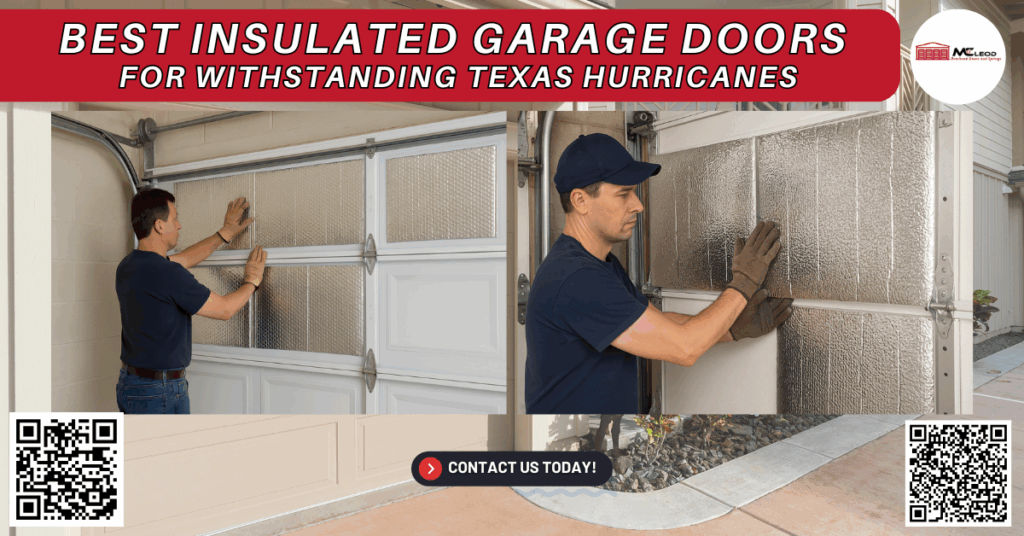When a Category 4 hurricane swept across the Texas Gulf Coast, a homeowner in Baytown watched helplessly as their garage door gave way to 130 mph winds. In minutes, the non-insulated, outdated door collapsed inward. The storm’s pressure change sucked off the roof and exposed the entire home to wind and rain. If only they had installed hurricane-rated insulated garage doors, the damage could have been minimized or even avoided.
This isn’t just a rare incident, it’s a common and costly mistake. Studies show that up to 80% of residential wind damage during a hurricane begins with a garage door failure. In Texas, where hurricane season brings high winds, intense rain, and flying debris, having the right insulated garage door isn’t just a luxury; it’s a necessity.
At McLeod Overhead Doors and Springs, we’ve helped dozens of homeowners and businesses in Baytown, TX, protect their garage spaces with high-performance, insulated garage doors that stand up to hurricane-force winds while improving energy efficiency year-round. In this guide, we’ll explore the best insulated garage doors, their insulation materials, types, pros and cons, and how you can prepare for Texas storms without compromising comfort or curb appeal.
Why Insulated Garage Doors Matter in Texas
Living in Texas means dealing with hot summers, mild winters, and unpredictable storms, including hurricanes. This climate puts immense pressure on your garage door, especially if it’s a non-insulated door. That’s where insulated garage doors come in. These doors are built with multiple layers of materials like steel, aluminum, and insulation foam, such as polyurethane or polystyrene, designed to provide more than just structure. They offer weather resistance, temperature regulation, and energy savings.
Benefits of an Insulated Garage Door:
- Storm Protection: Reinforced panels with high R-values resist wind pressure and thermal transfer, keeping the garage door intact during hurricanes.
- Energy Efficiency: Thick insulation helps maintain stable temperatures in your garage space, reducing energy loss and cutting down your energy bills.
- Noise Reduction: Insulated garage doors significantly reduce noise pollution, both from outside sources and from the door’s operation.
- Durability: Materials like urethane, foam insulation, and steel panels extend the life of your door by resisting rust, dents, and damage from the elements.
- Temperature Control: Insulated garage doors help your garage stay cooler in summer and warmer in winter, protecting stored items and reducing wear on your garage door opener and logic board.
If your car garage door faces direct sun or strong coastal winds, the right insulation can go a long way toward protecting your investment and keeping your garage space usable year-round.
Key Features to Look for in a Hurricane-Ready Insulated Garage Door
Choosing an insulated garage door that can withstand hurricane-force winds requires more than just picking one that “looks strong.” You’ll need to evaluate multiple features to ensure the door is built for Texas weather, long-term durability, and energy efficiency.
1. Wind Load Rating & Impact Resistance
Start with the wind load rating, which tells you how much wind pressure the door can handle. For areas like Baytown, your garage door should meet or exceed local building codes with wind resistance of at least 130–150 mph. Look for garage doors labeled as impact-rated or storm-ready, built with steel-reinforced struts, thick panels, and heavy-duty hardware kits.
2. Insulation Material: Polyurethane vs. Polystyrene
Your choice of insulation material plays a major role in both temperature regulation and storm durability. There are two popular types:
- Polyurethane (Spray Foam Insulation):
This dense foam is injected between panels, expanding and bonding tightly to the door structure. It has high R-values (up to R-18), great noise reduction, and excellent structural strength. It’s ideal for hurricane resistance. - Polystyrene (Rigid Foam Panels):
A more affordable alternative, polystyrene panels are fitted between the layers of the garage door. These provide moderate thermal insulation (typically R-6 to R-9) and some structural benefits.
Rigid foam, batt insulation, and even fiberglass insulation are sometimes used in garage door insulation kits, but for hurricane protection, urethane-based polyurethane insulation is generally superior.
3. Steel or Aluminum Construction
Steel garage doors with multiple layers (24- or 25-gauge steel) are ideal for hurricane protection. These doors may also feature a layer of galvanized steel or be coated for rust resistance. Aluminum doors, while lighter, are not always as durable unless specifically reinforced.
4. Panel Design and Reinforcements
Hurricane-resistant insulated doors are often sectional doors with reinforced brackets, hinges, and track systems. Reinforcement kits often include horizontal steel struts, steel end caps, and upgraded rollers to hold up under pressure.
Top Insulated Garage Door Brands for Texas Homes and Businesses
At McLeod Overhead Doors and Springs, we only work with trusted, top-rated brands known for delivering storm protection, insulation performance, and design options. Here are some of our favorites:
🚪 Clopay Garage Doors – WindCode® Series
- Built with Intellicore® polyurethane insulation for an R-value of up to 18.4
- Available in craftsman garage door and carriage house styles
- Designed to withstand Category 4 hurricane winds
- Great for homeowners seeking both performance and curb appeal
🚪 Amarr Garage Doors – Hurricane-Rated Collection
- Offers multi-layer steel and polyurethane-insulated doors
- Wind pressure resistance up to +70/-70 PSF
- Optional door insulation kits and reinforcement systems
- Excellent return on investment with reduced energy bills and fewer repairs
🚪 Wayne Dalton Model 8700
- Durable vinyl exterior with injected polyurethane foam core
- High resistance to rust, corrosion, and UV damage
- Comes with factory-installed reinforcement options
🚪 Martin Garage Doors – Wind-Rated Models
- Designed for coastal homes and commercial spaces
- Optional styrofoam, urethane, or polyurethane insulation
- High customizability with a wide range of materials, colors, and designs
Residential vs. Commercial Needs
Whether you’re protecting a car garage door in your home or a commercial facility, the needs differ slightly:
🏠 Residential Insulated Garage Doors
- Must combine weather protection, energy savings, and aesthetics
- Popular materials: steel, fiberglass, and composite panels
- Include features like smart openers, light sockets, and remote automation
🏢 Commercial Insulated Garage Doors
- Designed for heavy use with industrial-grade materials
- Prioritize security, reinforcement kits, and thick insulation
- Often larger, roll-up types with higher wind resistance
Both sectors benefit from insulation materials that block heat transfer, especially when storing sensitive items or vehicles.
Energy Savings with Insulated Garage Doors
Besides storm protection, insulated garage doors offer year-round benefits through heat insulation and energy efficiency.
- During Texas summers, the garage can reach over 110°F. Without proper insulation, this heat transfer seeps into the home.
- In winter, cold air entering the garage lowers the indoor temperature, triggering higher heating costs.
- A door with a high R-value (thermal resistance rating) creates a strong barrier against outside temperatures, reducing HVAC usage.
Even the initial cost of a new insulated garage door pays off through long-term energy savings, comfort, and durability.
Maintenance and Storm Prep Tips
An insulated, impact-rated garage door still needs regular maintenance to perform well during hurricanes and all year long.
🔧 Maintenance Guide:
- Lubricate hinges, springs, and rollers to reduce wear
- Inspect the weatherstripping and garage door seal for gaps or damage
- Check your garage door opener and logic board for faults
- Clean off dirt and inspect panels for rust or cracks
- Test the door’s balance and safety sensors regularly
🌪️ Storm Prep:
- Reinforce your door with hurricane kits or brace bars
- Remove items that could become projectiles in the garage
- Backup your opener’s power supply using a battery unit
- Schedule a professional garage door inspection before each hurricane season
How Can McLeod Overhead Doors and Springs Help You?
At McLeod Overhead Doors and Springs, we understand the local challenges that come with living near the Texas coast. That’s why we provide a full range of garage door services, including installation, repair, and insulation upgrades tailored for storm-prone areas like Baytown.
📍 Visit us at:
8820 N Hwy 146, Baytown, TX 77520, United States
📞 Call now:
(281) 603-2885
From Clopay, Amarr, and Wayne Dalton garage doors to custom hurricane kits, we’ve got the tools, training, and insulation materials you need for peace of mind. Whether you’re replacing an old unit or installing a brand-new, energy-efficient insulated garage door, we’re here to walk you through every step.
💡 Don’t wait until hurricane season hits!
Contact us today to schedule your free consultation and protect your home or business with reliable, storm-ready insulated garage doors from the team Baytown trusts most.
Frequently Asked Questions (FAQs)
1. Can I add insulation to my existing garage door instead of replacing it?
Yes, you can use garage door insulation kits with materials like rigid foam or batt insulation to improve your current door’s R-value, though it won’t be as effective as a fully insulated door built for hurricanes.
2. How do I know if my garage door meets Texas wind load requirements?
Check the manufacturer’s wind load rating label, usually located on the inside of the door, or consult a professional installer to confirm it complies with local building codes.
3. Do insulated garage doors require a more powerful garage door opener?
Not always, but heavier insulated doors may benefit from a more powerful opener (like ¾ HP or higher) to ensure smooth and reliable operation.
4. What is the average lifespan of a hurricane-rated insulated garage door?
With proper maintenance, these doors typically last 20 to 30 years, even in harsh weather conditions.

